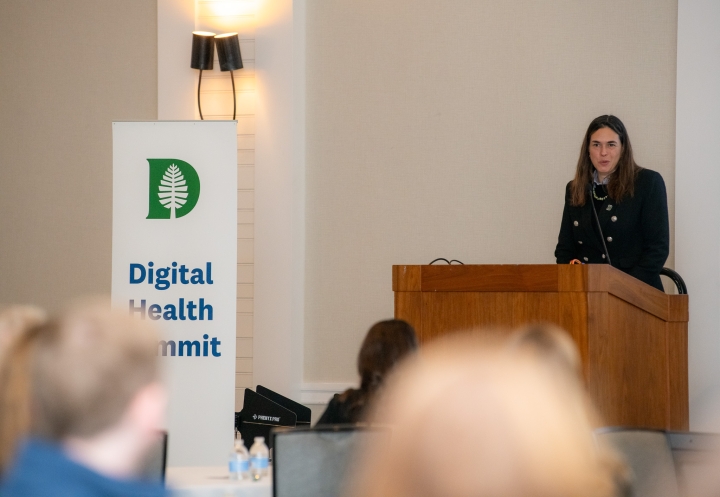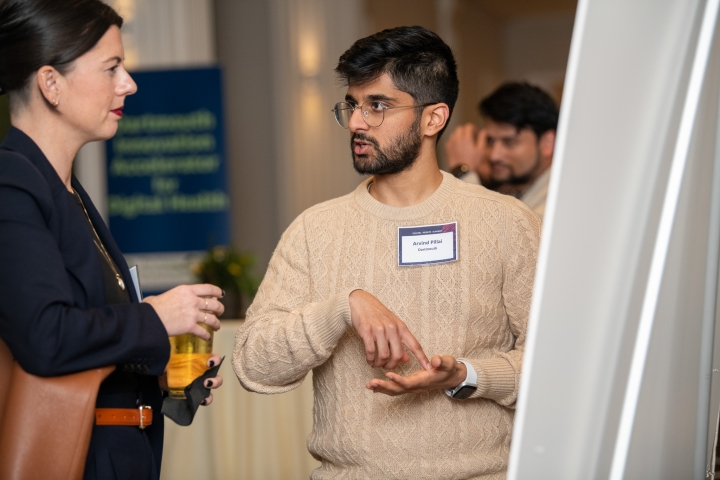The Clinically-Validated Digital Therapeutics: Innovations in Scientific Discovery, Clinical Applications, and Global Deployment event convened health care leaders across academia, government, and industry at the Hanover Inn on Oct. 25.
Hosted by the Center for Technology and Behavioral Health, the digital heath summit, now in its second edition, is the only one of its kind situated in an academic institution. Besides clinical and computer science researchers, it brings together diverse stakeholders—providers, regulators, payers, and investors, as well as representatives from global pharma—to create pathways for translating ideas in the space of digital health to impact.
In her welcoming remarks at the event President Sian Leah Beilock emphasized the urgency in realizing the potential of digital health in tackling mental health issues and other areas of health care.
While acknowledging that technology has played a role in exacerbating the mental health crisis, she believes that it can be a part of the solution as well.
“We can’t wait, is what I’m saying to you today. We can’t wait given our shortage of health care professionals. We can’t wait given this crisis. We don’t have time to sit back and watch this play out,” President Beilock said.
Events like the digital therapeutics symposium, which bring together every part of the health care ecosystem, Beilock said, are crucial catalysts that spark real dialogue, collaborations, and innovations that can propel health practices to the next level.
“Ideas are wonderful, but we have to be able to have impact, we have to be able to scale, and that only happens when we have all of us in the room together,” said Beilock. “Dartmouth is the kind of place where this should happen and we’re so proud to facilitate it. This is the time to be thinking about how we can really push the needle.”

Digital therapeutics is still a confusing term to people because it can mean so much, said Andy Molnar, CEO of the Digital Therapeutics Alliance, a trade organization serving the digital therapeutics industry.
Encompassing everything from developing electronic medical record systems to using wearable devices and other mobile technology to track and manage chronic conditions like diabetes, digital therapeutics has recently been defined by the International Organization for Standardization as “health software intended to treat or alleviate a disease, disorder, condition, or injury by generating and delivering a medical intervention that has a demonstrable positive therapeutic impact on a patient’s health.”
“It is really clear what the potential is, but it is really hard to get there,” said Molnar who summarized the current state of digital therapeutics in the U.S. and around the world and outlined the policy goals of the Digital Therapeutics Alliance.
Event speakers included representatives from the National Institute on Drug Abuse and the U.S. Food and Drug Administration. In addition to panel discussions that deliberated various paths and strategies to get health plan providers on board and the role of global pharma in scaling evidence-based digital therapeutics, the afternoon’s final session and subsequent poster presentation highlighted innovations in digital health at Dartmouth.
Nicholas Jacobson, assistant professor of biomedical data science, and CTBH Director Lisa Marsch presented preliminary results on their efforts to use mobile sensing data to assess behavioral patterns of people suffering from opioid use disorder with a view to designing effective therapeutic supports and interventions.
Catherine Stanger, professor of psychiatry and biomedical data science, described her work on a pilot program that provides financial interventions and health coaching to motivate behavior change in young adults with type 1 diabetes, the age group with the highest risk for hospitalizations.
Michael Heinz, a postdoctoral fellow at the Artificial Intelligence and Mental Health Lab who has developed an AI-driven therapist called Therabot now undergoing its first clinical trial, and Jacobson presented research on generative AI and large language models in mental health.
Finally, Barry Schweitzer, associate director of the Magnuson Center for Entrepreneurship, spoke about the Dartmouth Innovation Accelerator for digital health launched this year with the mission to accelerate the real world implementation of novel clinically validated digital therapeutics and other digital health tools developed by data innovators. Born out of discussions initiated at last year’s digital health summit, the accelerator has organized events to support and mentor budding entrepreneurs at Dartmouth.
“The talks and discussions were not centered on academia, which is what a lot of conferences tend to be, ” said Sukriti Ghosh, a PhD student in quantitative biomedical sciences. “This was a good way to see the different perspectives in the field and learn about diverse opportunities the field offers.”
In her final comments Marsch noted that several speakers highlighted ongoing efforts to explore alternatives paths that stakeholders are devising to get effective, clinically validated tools into the hands of people that use that them even as they wait for positive developments in the payer space that creates a broader coverage framework.
“We know that there’s great value in this space,” said Marsch. “We need to work together to distinguish hype from technologies that can drive the field forward and make a big impact in people’s lives.”
